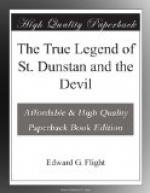1, Adam Street, Adelphi.
[Illustration]
ST. DUNSTAN AND THE DEVIL.
[Illustration]
[Illustration]
“And it is for trouth reported, that where this signe dothe appere, there the Evill Spirite entreth not.”—SERMON ON WITCHES.
“Your wife’s a witch, man; you should nail a horse-shoe on your chamber-door.”—REDGAUNTLET.
[Illustration]
ST. DUNSTAN AND THE DEVIL.
In days of yore, when saints were plenty,
(For each one now, you’d then find
twenty,)
In Glaston’s
fruitful vale,
Saint Dunstan had his dwelling snug,
Warm as that inmate of a rug,
Named in no polished
tale.
The holy man, when not employed
At prayers or meals, to work enjoyed
With anvil, forge,
and sledge.
These he provided in his cell,
With saintly furniture as well;
So chroniclers
allege.
The peaceful mattock, ploughshare, spade,
Sickle, and pruning-hook he made,
Eschewing martial
labours.
Thus bees will rather honey bring,
Than hurtfully employ their sting
In warfare for
their neighbours.
A cheerful saint too, oft would he
Mellow old Time with minstrelsy,—
But such as gave
no scandal;
Than his was never harp more famed;
For Dunstan was the blacksmith named
Harmonious by
Handel.
And when with tuneful voice he sang,
His well-strung harp’s melodious
twang
Accompaniment
lending;
So sweetly wedded were the twain,
The chords flowed mingled with the strain,
Mellifluently
blending.
Now ’tis well known mankind’s
great foe
Oft lurks and wanders to and fro,
In bailiwicks
and shires;
Scattering broad-cast his mischief-seeds,
Planting the germs of wicked deeds,
Choking fair shoots with poisonous weeds,
Till goodness
nigh expires.
Well, so it chanced, this tramping vagrant,
Intent on villanies most flagrant,
Ranged by Saint
Dunstan’s gate;
And hearing music so delicious,
Like hooded snake, his spleen malicious
Swelled up with
envious hate.
[Illustration]
Thought Nick, I’ll make his harp
a fool;
I’ll push him from his music-stool;
Then, skulking
near the saint,
The vilest jars Nick loudly sounded,
Of brayings, neighings, screams compounded;
How the musician’s ears were wounded,
Not Hogarth e’en
could paint.
The devil fancied it rare fun.
“Well! don’t you like my second,
Dun?
Two parts sound better sure than one,”
Said he, with
queer grimace:
“Come sing away, indeed you shall;
Strike up a spicy madrigal,
And hear me do
the bass.”




